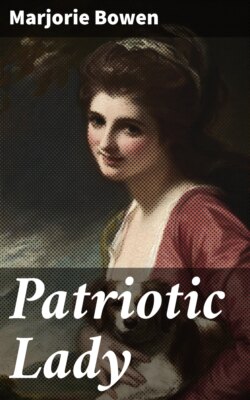Читать книгу Patriotic Lady - Bowen Marjorie - Страница 16
На сайте Литреса книга снята с продажи.
* * * * *
ОглавлениеTable of Contents
Mr. Greville was well pleased with the success of his experiment; the enthusiasm of George Romney confirmed his own judgment, rewarded his labour, his expense; he was gratified to find himself the possessor of a Thais in the flesh who far outshone the pictured charmer whom he had been so proud to have on his walls.
Emma was more beautiful than Emily Bertie, more beautiful than any woman in town. Romney proclaimed this truth in canvas after canvas, in hundreds of sketches and drawings.
For the first time in his sombre, lop-sided life the painter was happy, for the first time in a vagrant existence the model felt self-justification, self-respect; they combined to produce works of art that were, within definite limits, flawless.
Emma embodied Romney's faults as well as his merits; she was well within his powers of achievement; she had no charm that it was not within his perception to seize on and within his skill to reproduce. He was lucky to find a model that not only inspired but flattered his art, and she was lucky to find a painter who could celebrate her beauty with complete acquiescence in its perfection.
Emma Hart, as set out by Charles Greville and painted by George Romney, was, perhaps, as completely beautiful as any woman who has ever filled a painter's imagination, and it was a beauty for every eye. She was not the woodland lily visited by moonlight loveliness of Simonetta Vespucci, celebrated by Sandro Botticelli, that some people might have found fantastic and wan, nor the high-bred grace of the Lombard ladies with the smile of the Grecian Hermes that soothed, if it did not satisfy, the yearnings of Leonardo da Vinci.
Emma's charms neither raised nor solved any problem; she was neither wistful, tormented, nor aspiring, her fine features did not hint at any world of the spirit or at any whimsy of dreams. There was nothing of an enigma in her smooth contours, no question in her eyes, no puzzle on her lips, no subtlety in anything she did or was. Therefore she was completely within the range of George Romney, who had his yearnings after poetry and fancy, after "subject" pictures and illustrations of Shakespeare and Milton, but who never was completely successful save when dealing with the obvious graces of wholesome human nature.
Emma was the type to which he had already made some of his sitters conform; an oval face, small features in exact proportion, large dark eyes under sweeping brows, a fully curved mouth, a warm complexion richly flushed with rose, a profusion of red-brown hair, falling in heavy tresses. To these rare beauties Emma added a tall, finely shaped figure with a generously rounded bust and shoulders and swift, lovely movements.
Her defects were slight; extremely young as she was, she had more the solidity of a statue than the fragility of a flower; she was large-boned and her feet were clumsy; the face was slightly too broad, the neck slightly too long.
George Romney presented her under many names but with the fewest possible accessories, a classic robe, a muslin frock, or chemise, a sash, a Leghorn hat, a scrap of cambric to embroider, a spinning-wheel by which to sit; he painted her direct from life, taking three or four sittings of an hour or so each and finishing robes, hands and details from a professional model. He never allowed his work to be touched by pupils, and worked with great rapidity, often leaving one portrait unfinished, in his haste to begin the next. In these beloved studies his painfully acquired technique was never pushed beyond its limits; in painting Emma he was always well within the bounds of what he could do, not only easily, but almost unconsciously.
